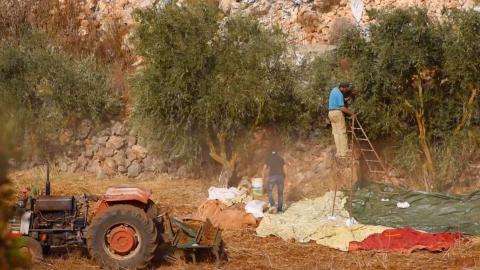
Israeli Scientists Discover Olives Were First Domesticated in Jordan Valley 7,000 Years Ago
JERUSALEM, Israel – From biblical times to modern times, olives have been a staple in cuisines around the world for thousands of years.
New research from the University of Tel Aviv reveals that inhabitants of the Jordan Valley first domesticated olives 7,000 years ago. The discovery marks the earliest evidence of the domestication of a fruit tree in the world.
Israeli researchers uncovered evidence of olive tree domestication by examining charcoal remains found during an archaeological excavation.
“Trees, even when burned down to charcoal, can be identified by their anatomic structure,” says Dr. Dafna Langgut, who led the study. “Wood was the 'plastic' of the ancient world. It was used for construction, for making tools and furniture, and as a source of energy. That's why identifying tree remnants found at archaeological sites, such as charcoal from hearths, is a key to understanding what kinds of trees grew in the natural environment at the time, and when humans began to cultivate fruit trees."
After examining charcoal remains from the Tel Zaf archaeological site in the Jordan Valley, Dr. Langgut found evidence of olive trees.
“Olive trees grow in the wild in the land of Israel, but they do not grow in the Jordan Valley," she says. "This means that someone brought them there intentionally – took the knowledge and the plant itself to a place that is outside its natural habitat. In archaeobotany, this is considered indisputable proof of domestication, which means that we have here the earliest evidence of the olive's domestication anywhere in the world.”
The olive tree remains were excavated in Tel Zaf by Israeli archaeologist Prof. Yosef Garfinkel from Hebrew University. He says a wealthy prehistoric village once inhabited the site.
"Tel Zaf was a large prehistoric village in the middle Jordan Valley south of Beit She'an, inhabited between 7,200 and 6,700 years ago,” says Prof. Garfinkel. “Large houses with courtyards were discovered at the site, each with several granaries for storing crops. Storage capacities were up to 20 times greater than any single family's calorie consumption, so clearly these were caches for storing great wealth. The wealth of the village was manifested in the production of elaborate pottery, painted with remarkable skill. In addition, we found articles brought from afar: pottery of the Ubaid culture from Mesopotamia, obsidian from Anatolia, a copper awl from the Caucasus, and more."
According to Dr. Langgut, the olive trees are not only evidence of wealth, but also “the formation of a complex multilevel society” with farmers and merchants working together to trade olive products.
"The domestication of fruit trees is a process that takes many years, and therefore befits a society of plenty, rather than one that struggles to survive,” says Langgut. “Trees give fruit only 3-4 years after being planted. Since groves of fruit trees require a substantial initial investment, and then live on for a long time, they have great economic and social significance in terms of owning land and bequeathing it to future generations – procedures suggesting the beginnings of a complex society. Moreover, it's quite possible that the residents of Tel Zaf traded in products derived from the fruit trees, such as olives, olive oil, and dried figs, which have a long shelf life. Such products may have enabled long-distance trade that led to the accumulation of material wealth, and possibly even taxation – initial steps in turning the locals into a society with a socio-economic hierarchy supported by an administrative system."
Langgut’s team published their findings in the journal Scientific Reports.




